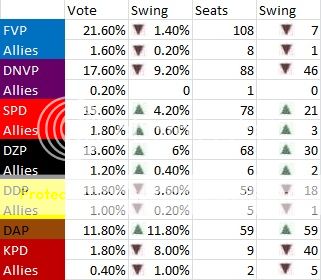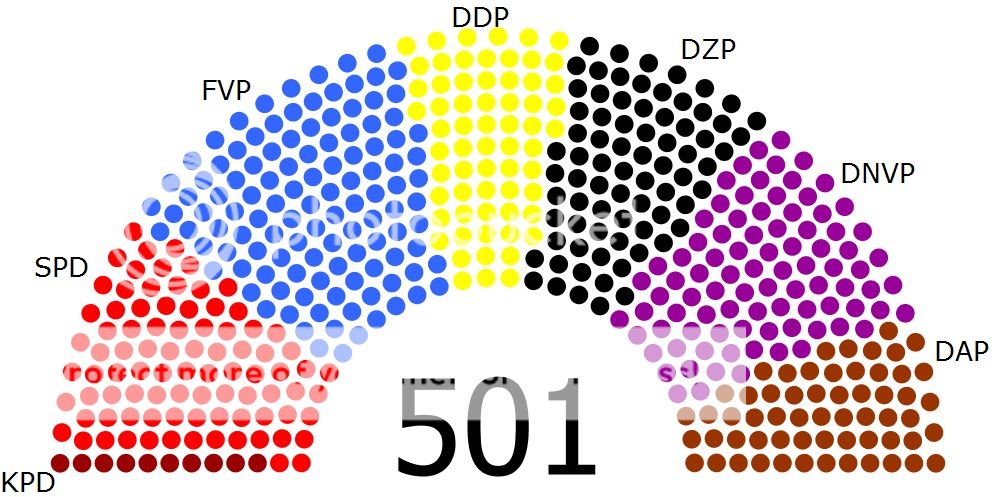The Election of 1909
The election of 1909 was marked by a number of surprises, including a startlingly vicious election campaign launched by the DDP against its coalition allies – somewhat souring relations – and even more astonishingly a series of amateurish blunders on the part of the Communist Party involving scandal, internal divisions, a lack of direction and a number of much publicised defections to the Social Democrats.
1909 saw the Weimar parties who had formed the Republic in 1898 and dominated its politics thereafter retain a substantial majority – even making gains in light of the collapse of the Communist vote. The Populists suffered minor losses, weakened by a resurgent Centre Party whilst the DDP’s vote lost around ¼ of its vote – pointing towards the failure of its prominent propaganda campaigns during the election. Alongside the Centre Party, which increased its share of the vote more than any other party save the recently formed DAP, the SPD was the biggest winner amongst the Weimar parties – the KPD’s collapse sending a significant share of the vote over to the Social Democrats. The disastrous nature of the Communist showing in 1909 is hard to exaggerate, the party saw its share of the vote fall by 9% to around 2% - leaving the party with a paltry 11 seats in the Reichstag and sending German Communism into a period of introspection and internal conflict as the party sought to renew itself. From the horrendous showing of the far left, the extreme right was triumphant. The fascistic German Workers’ Party won more votes than anyone had predicted as it secured 59 Reichstag seats, leading some to predict the party’s future emergence of the leading anti-Republican force on the German right. Despite its losses to the DAP seeing it fall from the position of the Reichstag’s largest party, the DNVP had reason to be confident following 1909 as the share of the assembly held by the anti-Republican right actually increased to an all-time high not far shy of 1/3 – it was clear that there existed a genuinely powerful threat to the existence of the German Republic, but no longer did it come from the left, but the political right.
The emergence of the German Workers’ Party had made cooperation between the ‘bourgeoisie’ Weimar parties (the DDP and DZP) with right far less attractive than in the past, making the continuation of the pre-election coalition little more than a case of renegotiating the coalition. With the retirement of reigning Chancellor Eugen Richter, and the fall in the DDP’s share of the vote, not to mention the sores left by the election campaign, a new Chancellor had to be appointed and President Stegerwald was determined that he not be another Liberal. Although Stegerwald and his party were keen on retaining the allegiance of the DDP to the governing coalition, they were no longer necessarily required for a majority (the SPD, FVP, and DZP being capable of forming a majority on their own) freeing the Populists to appeal to their less abrasive allies. The SPD was satiated with a promise of further reforms in the form of a limit to the working day at 12 hours and funds for the improved provision of healthcare whilst former President and Centre Party leader Konstantin Fehrenbach was offered the Chancellery alongside a commitment to offer funds to religiously controlled hospitals (particularly common in the Catholic South) – improving Church controlled facilities rather than aiming to replace them with secular, state controlled institutions. With the Centrists and Social Democrats satisfied the three parties all enthusiastically backed plans to leave the present, apparently highly successful, economic policies in place.
Having suffered losses at the polls and been shunned by their allies, the DDP was faced with an unenviable choice. On the one hand many within the party, including its leader Naumann, were eager to remain in government and attempt to reign in the reforming ambition of the left wing parties. However, rank and file pressure from market evangelists influenced by the emerging Austrian school of economics, and Liberal Nationalist historians made participation in government unfeasible. Caught within a rock and a hard place Naumann led the DDP out of government for the first time since the foundation of the Republic – promising to protect any Republican government from the right but finding himself unable to participate in a government than called for social reform and heavy state intervention in the economy.



